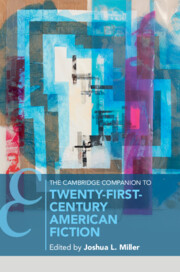Book contents
- The Cambridge Companion to Twenty-First-Century American Fiction
- The Cambridge Companion to Twenty-First-Century American Fiction
- Copyright page
- Contents
- Illustrations
- Contributors
- Acknowledgments
- Chronology
- Introduction
- Part I Forms
- Part II Approaches
- Part III Themes
- 11 Convergence
- 12 Dissolution
- 13 Immobility
- 14 Insecurity
- Further Reading
- Index
13 - Immobility
from Part III - Themes
Published online by Cambridge University Press: 02 September 2021
- The Cambridge Companion to Twenty-First-Century American Fiction
- The Cambridge Companion to Twenty-First-Century American Fiction
- Copyright page
- Contents
- Illustrations
- Contributors
- Acknowledgments
- Chronology
- Introduction
- Part I Forms
- Part II Approaches
- Part III Themes
- 11 Convergence
- 12 Dissolution
- 13 Immobility
- 14 Insecurity
- Further Reading
- Index
Summary
The concluding two chapters take up cultural responses to the ongoing violence perpetuated by mass incarceration and the global cycles of warfare and terror. Dennis R. Childs examines narratives of immobility based on police and state violence, imprisonment, and detention and deportation at national borders. He argues that “anti-carceral hip-hop” is the “aesthetic practice [that] represents the quintessential storytelling method for those most commonly targeted for police killing and imprisonment.” Reading hip-hop narratives within a “long twenty-first century” of radical literary, political, and musical practices since the 1970s, he links recent works by Dead Prez, Reyna Grande, Ann Jaramillo, Kendrick Lamar, Monifa Love, Main Source, Invincible, and Askari X to those of James Baldwin, Angela Davis, Public Enemy, Chester Himes, George Jackson, Audre Lorde, Toni Morrison, Assata Shakur, and Malcolm X.
Keywords
- Type
- Chapter
- Information
- The Cambridge Companion to Twenty-First Century American Fiction , pp. 251 - 270Publisher: Cambridge University PressPrint publication year: 2021

